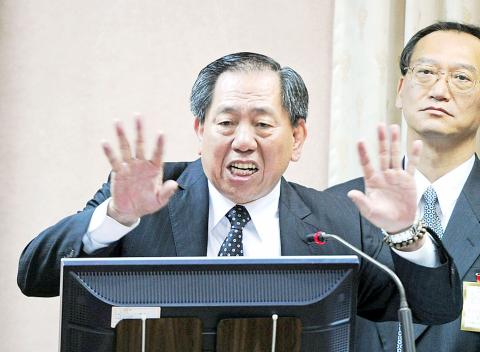National Security Bureau (NSB) Director Tsai Der-sheng (蔡得勝) yesterday said that his bureau does not support government agencies using China’s Huawei Technologies Co’s (華為) products and said the company should be barred from government bids.
Tsai made the remarks during a meeting of the legislature’s Foreign Affairs and National Defense Committee in the morning.
Democratic Progressive Party (DPP) Legislator Tsai Huang-liang (蔡煌瑯) asked Tsai Der-sheng whether government agencies, including the Presidential Office and the Ministry of Justice’s Investigation Bureau, had used Huawei’s network cards in their work cellphones.

Photo: CNA
He said that the government should be more alert to the possibility that confidential information could “very easily” be obtained by China via Huawei products.
Saying that Huawei is linked to the People’s Liberation Army, Tsai Huang-liang said that the government should ban the company from participating in public bids.
If the government itself is the biggest buyers of Huawei products, how could the government restrict private companies from buying Huawei products for national security concerns, he added.
“This is our policy now. The NSB has banned using Huawei’s products and thinks other government bureaus should not use the company’s products,” the NSB official added.
Tsai Huang-liang cited government statistics showing that the Investigation Bureau bought 124 sets of Huawei network cards, while the Presidential Office six sets and the Ministry of Transportation and Communications bought 20 Huawei cellphones.
The Mainland Affairs Council bought one set of Huawei’s network cards, but stopped using them after discovering they were produced by Huawei, he added.
The Investigation Bureau responded in a press statement that last year, it applied for a number of cellphone numbers from Chunghwa Telecom Co (中華電信) for agents’ internal communications, but Chunghwa offered network cards produced by Huawei with the numbers.
The Investigation Bureau added that those cellphones were closed-system cellphones used in inner network and could not be connected with the Internet or other networks.
The bureau is not concerned that confidential information could have been leaked by using those public phones, it added.
The Investigation Bureau said that it had no knowledge that the wireless network sticks it acquired from Chunghwa Telecom were manufactured by Huawei at the time of purchase.
“As the products have only been connected to the bureau’s closed internal network, there is no possibility that [confidential national security information] has been leaked,” the bureau said.
At a legislative session earlier yesterday, Tsai Huang-liang presented statistics regarding government agencies’ procurement of communication devices from Huawei in the past year.
The statistics showed that the Investigation Bureau had purchased 124 of Huawei’s E173 multi-mode wireless terminals, the largest number bought by any government agency.

Conflict with Taiwan could leave China with “massive economic disruption, catastrophic military losses, significant social unrest, and devastating sanctions,” a US think tank said in a report released on Monday. The German Marshall Fund released a report titled If China Attacks Taiwan: The Consequences for China of “Minor Conflict” and “Major War” Scenarios. The report details the “massive” economic, military, social and international costs to China in the event of a minor conflict or major war with Taiwan, estimating that the Chinese People’s Liberation Army (PLA) could sustain losses of more than half of its active-duty ground forces, including 100,000 troops. Understanding Chinese

The Ministry of Foreign Affairs (MOFA) yesterday said it is closely monitoring developments in Venezuela, and would continue to cooperate with democratic allies and work together for regional and global security, stability, and prosperity. The remarks came after the US on Saturday launched a series of airstrikes in Venezuela and kidnapped Venezuelan President Nicolas Maduro, who was later flown to New York along with his wife. The pair face US charges related to drug trafficking and alleged cooperation with gangs designated as terrorist organizations. Maduro has denied the allegations. The ministry said that it is closely monitoring the political and economic situation

UNRELENTING: China attempted cyberattacks on Taiwan’s critical infrastructure 2.63 million times per day last year, up from 1.23 million in 2023, the NSB said China’s cyberarmy has long engaged in cyberattacks against Taiwan’s critical infrastructure, employing diverse and evolving tactics, the National Security Bureau (NSB) said yesterday, adding that cyberattacks on critical energy infrastructure last year increased 10-fold compared with the previous year. The NSB yesterday released a report titled Analysis on China’s Cyber Threats to Taiwan’s Critical Infrastructure in 2025, outlining the number of cyberattacks, major tactics and hacker groups. Taiwan’s national intelligence community identified a large number of cybersecurity incidents last year, the bureau said in a statement. China’s cyberarmy last year launched an average of 2.63 million intrusion attempts per day targeting Taiwan’s critical

‘SLICING METHOD’: In the event of a blockade, the China Coast Guard would intercept Taiwanese ships while its navy would seek to deter foreign intervention China’s military drills around Taiwan this week signaled potential strategies to cut the nation off from energy supplies and foreign military assistance, a US think tank report said. The Chinese People’s Liberation Army (PLA) conducted what it called “Justice Mission 2025” exercises from Monday to Tuesday in five maritime zones and airspace around Taiwan, calling them a warning to “Taiwanese independence” forces. In a report released on Wednesday, the Institute for the Study of War said the exercises effectively simulated blocking shipping routes to major port cities, including Kaohsiung, Keelung and Hualien. Taiwan would be highly vulnerable under such a blockade, because it